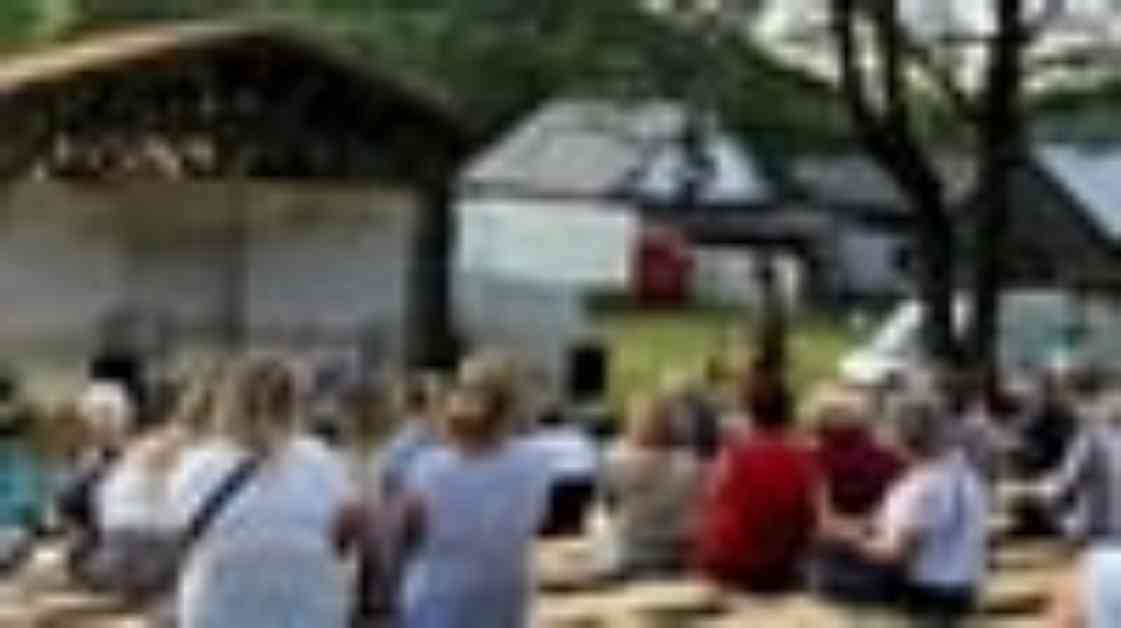Slovak Politician Causes Controversy at Irish Play Performance in Northern Slovakia
A far-right Slovak politician, Štefan Kuffa, caused a stir at an outdoor performance of the Irish play ‘Little Gem’ by Elaine Murphy in the village of Malá Franková in northern Slovakia last Sunday. Kuffa, who serves as Slovakia’s secretary of state for the environment, interrupted the play and demanded that parents remove their children from the audience. The incident, captured on video, shows Kuffa addressing the audience and insisting that all children leave the performance. Despite the majority of attendees being adults, Kuffa felt compelled to intervene due to what he perceived as inappropriate content for minors.
The play ‘Little Gem’, originally showcased at the Dublin Fringe Festival in 2008, has garnered widespread acclaim for its humorous portrayal of three generations of Dublin women and their experiences with love and loneliness. The Slovak adaptation of Murphy’s play, titled ‘My Baby’, is performed by the Košice National Theatre and is recommended for audiences aged 18 and above. However, during the performance in Malá Franková, a few children were present in the audience or in close proximity to the event.
The incident was first reported by Lukáš Marhefka, the editor of Zamagurské Noviny, an independent Slovak news outlet that covered the disruption at the play. Marhefka recounted Kuffa’s actions, stating that the politician objected to the content of the performance and insisted that children should not be exposed to what he deemed as inappropriate material. Despite objections from some audience members, Kuffa remained adamant about his stance, leading to a confrontation that disrupted the play.
Response to the Incident and Political Backlash
Following the incident, Kuffa released a video explaining his actions, claiming that the play featured inappropriate scenes with children on stage. While the disruption was eventually resolved when the village mayor intervened and Kuffa was escorted away, the aftermath of the incident sparked controversy and debate in Slovakia. Kuffa’s actions were supported by Slovakia’s deputy prime minister, Tomáš Taraba, who criticized the play for its alleged inclusion of LGBT+ content and offensive language.
The Košice National Theatre, responsible for the production of ‘My Baby’, issued a statement expressing regret over the lack of clarity regarding the play’s suitability for different age groups. The theatre emphasized that while parental discretion is advised when attending such performances, Kuffa’s intervention was unwarranted and disrupted the cultural event. The incident raised concerns about political interference in the arts and the government’s attempts to impose conservative values on public discourse.
Slovakia’s populist coalition government, led by Prime Minister Robert Fico, has faced criticism for its efforts to control public media and promote a nationalist agenda in the arts. Fico’s statements condemning progressive and liberal ideologies have fueled tensions within the country, leading to protests against government censorship and restrictions on artistic expression. The dismissal of cultural figures for alleged political activism has further fueled discontent among Slovak citizens, who view these actions as threats to freedom of speech and artistic autonomy.
Implications for Freedom of Expression and Cultural Diversity
The incident at the ‘Little Gem’ performance in Malá Franková underscores the challenges faced by artists and performers in navigating political sensitivities and societal norms. The clash between Kuffa’s conservative views and the artistic portrayal of human experiences in ‘Little Gem’ raises questions about the boundaries of creative expression and the role of government in regulating cultural productions. As Slovakia grapples with a shift towards nationalist values and censorship in the arts, the incident serves as a cautionary tale for the broader implications of political interference in artistic endeavors.
The controversy surrounding the play also highlights the importance of promoting diversity and inclusivity in cultural representations. By silencing voices and perspectives that challenge traditional norms, society risks stifling creativity and innovation in the arts. ‘Little Gem’, with its exploration of intergenerational relationships and personal struggles, offers a nuanced reflection of human experiences that resonate across borders and languages. Efforts to censor or restrict such works not only limit artistic freedom but also deprive audiences of opportunities to engage with diverse narratives and perspectives.
In response to the incident, members of the artistic community in Slovakia and abroad have voiced their support for creative freedom and the right to express challenging or controversial ideas through art. Calls for tolerance, open dialogue, and respect for differing viewpoints have emerged as essential pillars of a vibrant and inclusive cultural landscape. As the debate over the boundaries of artistic expression continues, the incident at the ‘Little Gem’ performance serves as a reminder of the ongoing struggle to uphold freedom of speech and protect the integrity of creative works in the face of political pressures and ideological conflicts.
The clash between political ideologies and artistic expression in Slovakia reflects broader global trends towards the politicization of culture and the erosion of democratic values. In an era marked by rising nationalism, populism, and censorship, the role of artists as advocates for social change and defenders of free expression becomes increasingly crucial. By standing up against attempts to silence dissenting voices and restrict artistic freedoms, individuals and communities can uphold the principles of democracy and diversity that form the foundation of a vibrant and inclusive society.
As Slovakia navigates the challenges of political polarization and cultural censorship, the incident at the ‘Little Gem’ performance serves as a poignant reminder of the power of art to transcend boundaries, provoke thought, and inspire change. By engaging with diverse perspectives and embracing artistic expression in all its forms, societies can foster dialogue, empathy, and understanding that transcend political divides and foster a more inclusive and harmonious future for all.













